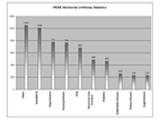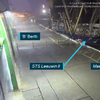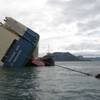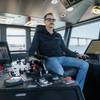UK P&I Club’s PEME Program Completes 250,000 Mariners
The UK P&I Club’s Pre-Employment Medical Examination (PEME) Programme is proving extremely successful with shipowners and managers and recently completed its 250,000th seafarer examination.
Garry Jose G Ramos, who first went to sea in 1997, undertook the 250,000th examination at the scheme’s accredited Angelus Medical Clinic in Makati, the leading business centre in the Philippines. An oiler employed by Döhle-Philman Manning Agency, Mr Ramos passed the examination with flying colours, as he has done on nine other occasions over the past 14 years, and is now free to continue his seagoing career with Döhle-Philman. Captain Manolo T Gacutan, who is President and General Manager of Döhle-Philman, is a fan of the PEME programme:
”Ensuring that their crews are fit and healthy should be important to any owner or manager. It reduces significantly the risk of crews becoming ill while serving on vessels and reduces the probability that a crew member will require hospitalisation overseas or need to be repatriated by air.
“For the seafarer, PEME offers a regular health check-up that can catch illnesses in the early stages, increasing the likelihood that he or she will make a quick and full recovery after treatment. It also reduces the worry that the seafarer shares with the owner/manager that he will become ill far from home and if in mid-ocean, far from professional medical attention.
“I congratulate the UK P&I club on reaching this landmark of a quarter-million examinations and look forward to hearing that they have passed the half-million mark.”
Responding, Sophia Grant, who heads the PEME programme on behalf of the UK Club, congratulated Mr Ramos and thanked Captain Gacutan and Döhle-Philman for their longterm support. She added:
“We established the PEME programme in 1996 but it was not until December 2005 that we completed the 100,000th examination. It’s taken less than six years to add another 150,000 and with more owners and managers signing up for the programme every year, the numbers are bound to increase rapidly.”
There are now nine PEME examination centres in the Philippines, eight in Metro Manila and one in Cebu, but the Angelus Medical Clinic has been working with the Club right from the beginning of the scheme. It was fitting therefore that Dr Gertrudes Pica-Axibal, President of Angelus Medical Clinic, Inc, was on hand to congratulate Mr Ramos. She commented:
“Working with the UK Club’s PEME team, we have experienced continuous improvement in prescribed standards and programmes that are focused on seafarers’ welfare. We try our best to comply with these standards and provide service beyond what is expected.”
The UK P&I Club’s Pre-Employment Medical Examination (PEME)
As stated earlier by Ms Grant, the PEME programme was established in 1996. Its aim is to minimise shipowners’ exposure to claims arising from crew medical conditions existing prior to employment and to provide seafarers with a clean bill of health before going to sea. Since 1996, the scheme has steadily increased its number of accredited clinics at key crewing centres around the world as well as the annual throughput of examinees.
Some 15 years later, PEME has become one of the UK P&I Club’s most successful loss prevention initiatives. Since its inception, the scheme has identified more than 8300 crew as medically unfit for employment at sea. If all rejected candidates had incurred average claims costs of about US$12,000, the bill would have been around US$100 million. Clearly, not every rejected candidate would have gone on to make a claim but a substantial proportion would. At an average of US$112, examinations have cost just US$28 million. Whilst it is impossible to be specific about savings, the UK P&I Club points out that they must amount to tens of millions of dollars.
“PEME’s achievements are clear: fewer claims, safer ships, less disruption and fitter and healthier crews” says Ms Grant.
“The programme team feels that the stabilising of rejections and the nominal number of repatriations is testimony to the programme achieving its primary aim of screening out a significantly higher proportion of pre-existing medical defects. The very existence of a quality examination has almost certainly discouraged crew applicants aware of their unfitness from being examined at all.”
According to Ms Grant, the Club’s strategy for future development of PEME involves steady expansion and a period of thorough clinic audits.
”We plan to bring more clinics into the network and are specifically looking at Greece, Poland and Russia. This could be achieved through a joint venture with health management companies or directly with individual clinics. These organisations must share the UK P&I Club’s values as we will not compromise on our standards.”
Today, the needs of 67 owners of tankers, bulkers, passenger ships and other vessels, as well as crew management companies, are catered for by 43 accredited clinics around the world. Most fleets enjoy protection & indemnity cover from the UK P&I Club but a few have continued to support PEME while placing their ships with other clubs.
There are now nine clinics in both the Philippines and India, four in Croatia, three in South Africa and the UK, two in Australia and one each in Indonesia, Hungary, Ireland, Spain, Thailand, Ukraine, and the USA. The throughput at the busiest clinic, that in Manila, accounts for more than half of the worldwide total. Selection is driven by the geographical requirements of supporting members.
The steady expansion in clinic facilities has meant an increased workload for the PEME team in researching, assessing, interviewing and negotiating arrangements with new clinics; and an expanded role in monitoring and discussing the performance of accredited clinics. Independent medical quality auditing takes place every three years for each clinic and involves comprehensive inspections of clinic facilities, thorough discussion with clinic staff and extensive audit questions. Recommendations for enhanced facilities and best practice suggestions are sent to each clinic following the audit.
Seafarer candidates are given an extensive examination supplemented by advice on vaccinations and lifestyle changes as necessary. Successful candidates must embark within three months or their clearance is no longer valid. Each clinic is fully accountable for excluding examinees if there is any doubt about fitness.
The main reasons for rejection have consistently been hepatitis B, followed by hearing problems.
Explains Ms Grant: “Some seafarers - and even owners - were initially sceptical about the enhanced standards of the UK Club examination and the purpose of the programme. Many now accept it has benefits as an effective means of loss prevention and quality control.”
Having provided applicants with a health check, clinics give advice on appropriate treatment for those found unfit. When they recover fully, they are eligible to resubmit themselves for examination.
A PEME brochure and updated details of the programme are available on the Club’s website (www.ukpandi.com), with a range of other loss prevention material addressing shipboard safety and crew issues.
The Angelus Medical Clinic
The Angelus Medical Clinic describes itself as a full-service, one-stop shop industrial medical facility in the Philippines, providing comprehensive medical screening of seafarers. It adheres to international seafaring medical testing standards and guidelines and is a pioneer among the UK Club’s accredited clinics.
Located in Makati, the central business district of Metro Manila, it is easily accessible for existing patrons and first time clients using public and private transport. The medical clinic is constantly upgraded, rendering its patrons the confidence that the facility is up to par in terms of physical up-keep as well as the professional medical services it provides.
To meet the expectations of its international clients, it has a state-of-the-art laboratory and drug testing facility. It also has ECG, PFT, Optical/Ishihara audiometry and dental treatment clinics plus in-house areas for treadmill stress testing, Chester Step Test, psychological examination, digital/filmless X-ray, private ultrasound and functional capacity exercise facilities.















